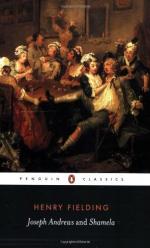|
This section contains 7,938 words (approx. 27 pages at 300 words per page) |

|
SOURCE: Frank, Judith. “Literacy, Desire, and the Novel: From Shamela to Joseph Andrews.” The Yale Journal of Criticism: Interpretation in the Humanities 6, no. 2 (fall 1993): 157-74.
In the following essay, Frank offers a reading of Shamela that departs from earlier analyses about bourgeois politics and literary representation, arguing that the novel is about literacy and desire among the lower classes, a theme that Fielding further develops in Joseph Andrews.
Like the transition from traditional open-field to capitalist agriculture or the transition from a paternalistic to a contractual model of labor and service, the rise of literacy in England is one of those historical processes whose length and ubiquitousness challenge our claims to a rigorous historical specificity.1 What the plentiful figures on literacy in the pre-modern period show us is that literacy was always already, seemingly trans-historically, on the rise. These figures bear out what we easily intuit: that literacy...
|
This section contains 7,938 words (approx. 27 pages at 300 words per page) |

|


